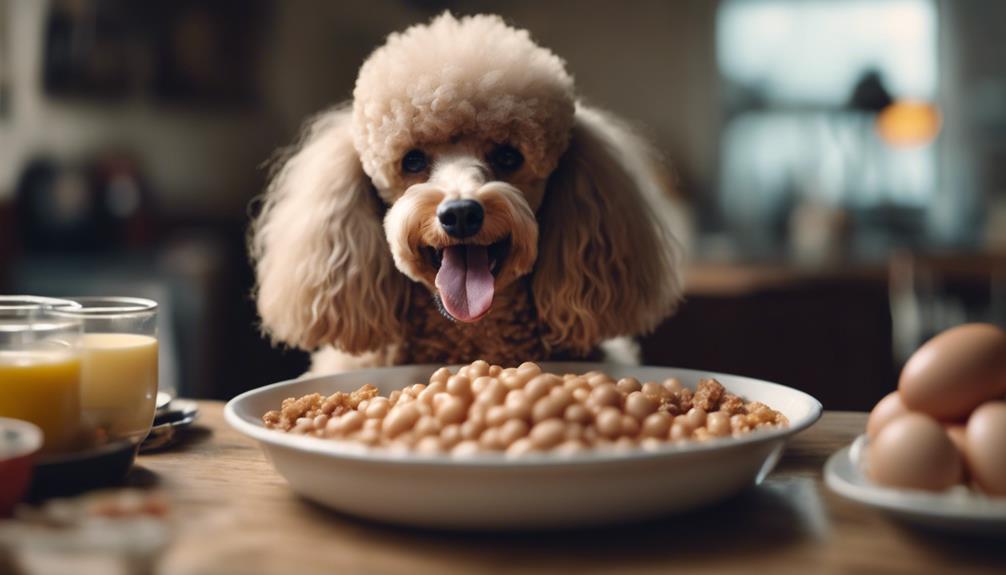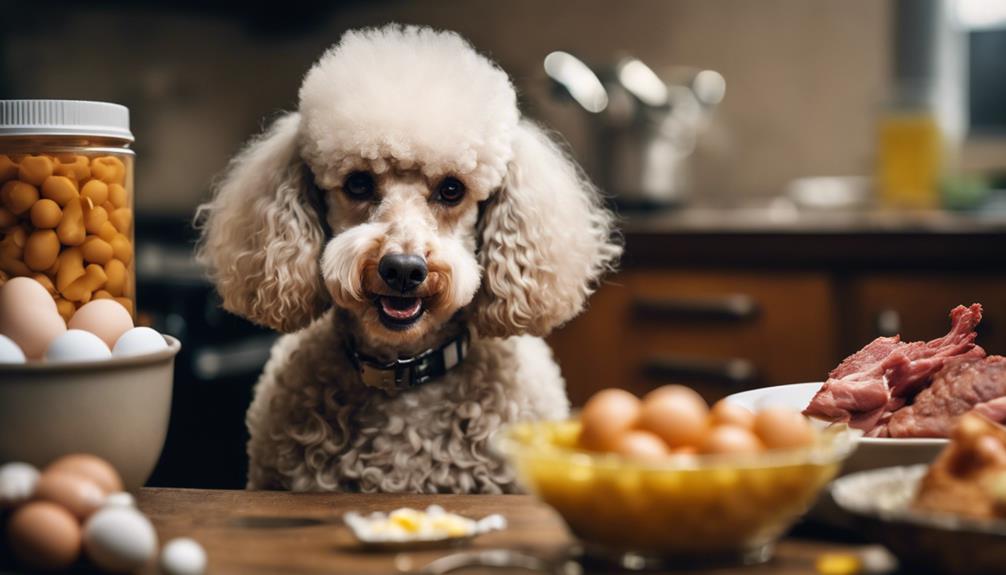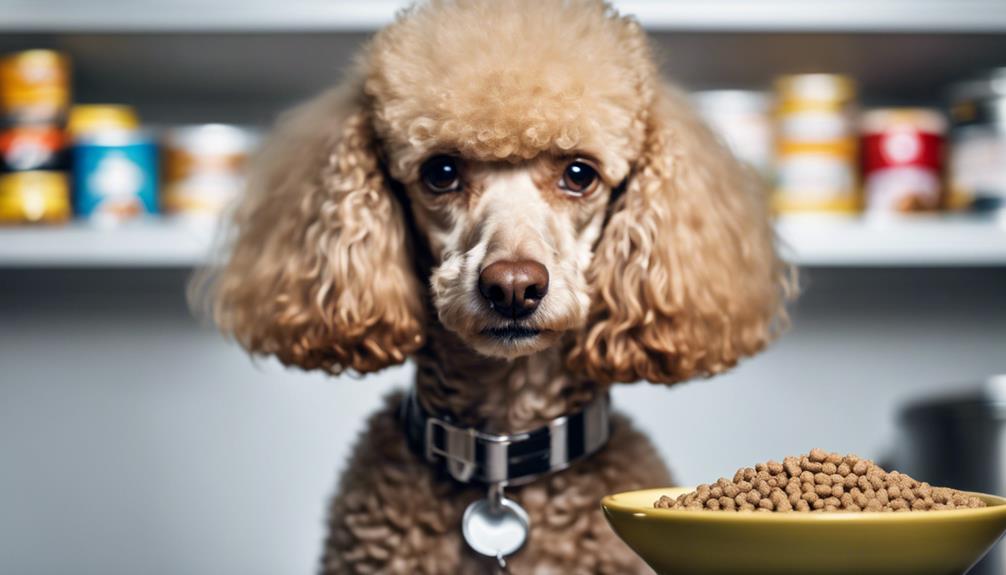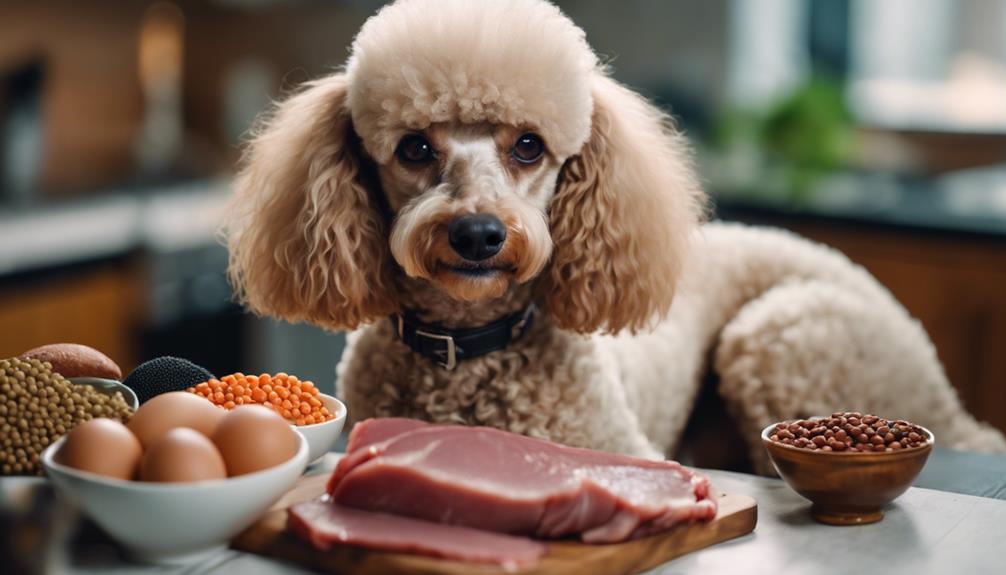If you were to compare high-protein diets for Poodles to a well-oiled machine, you’d see the potential for optimal functioning. However, like any intricate system, there are delicate balances to consider. As you explore the benefits and risks of incorporating high-protein foods into your Poodle’s diet, the path to understanding their unique nutritional needs might not be as straightforward as you think. Stay tuned to unravel the complexities of high-protein diets for Poodles and how they could impact your furry companion’s well-being.
Key Takeaways
- Tailored protein levels support muscle development, weight management, and immune health in Poodles.
- Consult a vet to mitigate risks of high-protein diets on kidneys, liver, and weight.
- Smooth transition, hydration, and monitoring ensure Poodles thrive on high-protein diets.
- High-quality, easily digestible proteins aid in energy, muscle development, and weight control for Poodles.
Poodle Nutrition: High-Protein Essentials

In Poodle nutrition, high-protein essentials play a crucial role in supporting muscle development, overall health, and energy needs. Poodles require high-quality protein to thrive, as it is vital for muscle growth and repair. High-protein diets can also help meet the energy requirements of active Poodles, ensuring they have the stamina to engage in their playful activities. Additionally, adequate protein intake is necessary for maintaining a healthy coat and skin, keeping your Poodle looking their best.
Furthermore, protein-rich diets can aid in weight management and prevent obesity in Poodles by promoting a feeling of fullness and supporting lean muscle mass. Not only does proper protein intake benefit your Poodle’s physical health, but it also plays a significant role in strengthening their immune system. By supporting immune function, high-quality protein can help protect your Poodle from illnesses, contributing to their overall well-being and longevity.
Protein Requirements for Poodles

To ensure optimal health and function, it’s crucial to understand the protein requirements for your Poodle. Guidelines for protein intake and the potential health implications of protein levels are essential considerations. Tailoring protein levels based on individual factors like age, size, activity level, and health status can support your Poodle’s overall well-being.
Protein Intake Guidelines
Poodles’ optimal health and nutrition hinge on ensuring their diet includes a minimum of 18% crude protein. When selecting high protein dog food for Poodles, consider that moderately high protein content falls between 22-29%, while high protein diets exceed 30%. These diets can aid in muscle development, energy levels, and skin and coat health. However, protein needs for Poodles vary based on factors like age, size, and activity level. Consulting a veterinarian is crucial to tailor protein intake to your Poodle’s specific requirements. By carefully considering these factors and seeking advice from a professional, you can ensure your Poodle receives the appropriate protein levels for their overall well-being.
Health Implications of Protein
Considering the critical role of protein in maintaining your Poodle’s energy levels and overall health, it is imperative to understand the specific protein requirements tailored to their needs. Poodles require a minimum of 22% protein in their diet to support muscle maintenance, tissue repair, and a robust immune system. Adequate protein intake is crucial for their coat health, ensuring a shiny and healthy fur. Protein plays a vital role in tissue repair and growth, contributing to overall health and development in Poodles. Insufficient protein levels can lead to muscle wasting and weakness, impacting their mobility and strength. Therefore, maintaining proper protein levels in your Poodle’s diet is essential for a strong immune system, aiding in disease resistance and promoting overall well-being.
| Protein Requirements for Poodles | |
|---|---|
| Muscle Maintenance | 22% of diet |
| Tissue Repair | Essential for growth |
| Immune System | Strength and resistance |
Benefits of High-Protein Diets

When feeding your Poodle a high-protein diet, you are providing essential support for their muscle development and maintenance. High-protein diets offer a range of benefits that contribute to your Poodle’s overall well-being:
- Enhanced Muscle Development: Protein is crucial for building and repairing muscles, ensuring your Poodle stays strong and agile.
- Improved Energy Levels: Adequate protein intake supports sustained energy levels, enabling your Poodle to be active and playful throughout the day.
- Essential Amino Acids: High-protein diets provide essential amino acids necessary for various bodily functions, including tissue repair and immune system support.
Risks Associated With High Protein

To ensure the well-being of your Poodle, it is crucial to be aware of the potential risks associated with high protein diets. High protein intake can strain the kidneys and liver, especially in dogs with preexisting health issues. This strain can be detrimental to your Poodle’s overall health. Additionally, excessive protein consumption can lead to weight gain, a concern for Poodles prone to obesity. Dogs with underlying kidney problems are particularly at risk of experiencing further complications when on a high protein diet. Monitoring your Poodle’s protein intake is essential to prevent health issues, especially for those sensitive to protein levels. Consulting with a veterinarian is paramount to determine the appropriate protein levels for dogs at risk, as they can provide tailored advice based on your Poodle’s specific health needs. Prioritizing your Poodle’s health by being mindful of these risks will contribute to their long-term well-being and happiness.
Protein Intake for Poodle Health

Ensure your poodle’s diet meets the minimum 18% crude protein requirement for optimal health. Tailor protein intake based on factors like age, size, and activity level to support muscle growth and overall well-being. Consult your veterinarian to determine the appropriate protein levels and monitor your poodle’s body condition to prevent health issues related to protein excess or deficiency.
Optimal Protein Levels
For optimal health and well-being, Poodles require varying levels of protein intake depending on factors such as age, size, and activity level. When considering the protein needs of your Poodle, keep in mind the following:
- Puppies: Require higher protein levels for optimal growth and development.
- Adult Poodles: Benefit from moderate to high protein levels to maintain muscle mass and energy.
- Senior Dogs: May need lower protein levels to support aging organs and overall health.
Adjusting the protein intake according to your Poodle’s life stage is crucial for their health. Consulting with a veterinarian can provide valuable guidance in determining the ideal protein levels tailored to your Poodle’s specific requirements.
Potential Health Risks
What potential health risks can arise from excessive protein intake in Poodles? Poodles are susceptible to kidney and liver strain from high protein diets, which can lead to various health issues. Additionally, they are prone to weight gain, which can be exacerbated by an imbalanced high protein diet. To highlight the risks associated with excessive protein intake for Poodles, refer to the table below:
| Potential Health Risks of High Protein Diets for Poodles |
|---|
| Strain on Kidneys and Liver |
| Weight Gain |
| Inefficient Protein Processing in Poodles with Health Issues |
| Importance of Consulting a Veterinarian |
Ensure to consult with a veterinarian to determine the appropriate protein levels for your Poodle and prevent these potential health risks.
Potential Digestive Issues

To minimize potential digestive issues in poodles transitioning to high-protein diets, a gradual change in their food is recommended. Poodles, especially those with sensitive stomachs, may experience digestive upset when suddenly switching to a high-protein diet. Here are some tips to help your poodle adjust smoothly:
- Slow Transition: Introduce the new high-protein food gradually by mixing it with their current food over a period of 7-10 days.
- Hydration: Ensure your poodle has access to fresh water at all times, as high-protein diets can increase their water needs.
- Regular Monitoring: Keep an eye on your poodle’s stool consistency and frequency. Changes in these can indicate how well they are tolerating the new diet.
Monitoring your poodle’s response to the diet change is crucial. If you notice persistent digestive issues, consult with your veterinarian for guidance on managing their diet effectively. By being attentive and making adjustments as needed, you can help your poodle thrive on a high-protein diet while keeping digestive problems at bay.
High-Protein Diet and Weight Management

To effectively manage your poodle’s weight while on a high-protein diet, ensure that the protein levels are balanced with other essential nutrients to support their overall health. High-protein diets can aid in weight management for Poodles by promoting lean muscle mass, which is essential for burning calories and maintaining a healthy weight. Protein also helps Poodles feel full longer, potentially reducing overeating and aiding in weight control. Moreover, proper protein intake can support your Poodle’s metabolism, which plays a crucial role in weight management. It is important to remember that high-protein diets for Poodles should be well-rounded with other essential nutrients to ensure their overall health and well-being. Consulting with a veterinarian is crucial to determine the right protein levels that align with your Poodle’s specific weight management needs.
| Benefit of High-Protein Diet for Weight Management |
|---|
| Promotes lean muscle mass |
| Helps in reducing overeating |
| Supports metabolism for weight control |
Protein Quality Matters for Poodles

For poodles, ensuring high-quality protein sources like chicken, fish, and eggs is essential for optimal health and well-being. When it comes to protein quality, choosing the right sources can significantly impact your poodle’s muscle health and energy levels. Here are three key points to consider:
- Animal-Based Proteins: Opt for animal-based proteins as they are more easily digestible and contain essential amino acids crucial for your poodle’s overall well-being.
- Muscle Health: High-quality proteins support muscle maintenance and growth, helping your poodle stay strong and active.
- Energy Levels: The digestibility and bioavailability of amino acids in protein play a vital role in sustaining your poodle’s energy levels throughout the day.
Impact on Poodle Energy Levels

High-protein diets play a crucial role in impacting your poodle’s energy levels. By consuming adequate protein, your poodle can maintain the stamina needed for its active lifestyle. Ensuring an optimal balance of protein in their diet can help sustain the high energy demands of your poodle throughout the day.
Royal Canin Poodle Adult Breed Specific Dry Dog Food, 10 lb bag
Features
| Is Discontinued By Manufacturer | No |
| Product Dimensions | 23 x 13 x 3 inches; 10 Pounds |
| Manufacturer recommended age | 1 month and up |
| Item model number | 450910 |
| Department | dog-dry-food |
| Date First Available | February 9, 2010 |
| Manufacturer | Royal Canin |
| ASIN | B0037TUHAY |
| Country of Origin | USA |
- Royal Canin Poodle Adult dry dog food is designed to meet the nutritional needs of purebred Poodles 10 months and older
- Exclusive kibble design helps Poodles easily pick up and chew their food
- Helps maintain a Poodle’s coat health with EPA and DHA fatty acids from fish oil and precise protein levels to support continuously growing hair
- Supports a Poodle’s strong build with precise protein content to maintain muscle tone
- An exclusive blend of nutrients supports vitality and healthy aging during their long life span
Royal Canin Poodle Puppy Breed Specific Dry Dog Food, 2.5 lb bag
Features
| Is Discontinued By Manufacturer | No |
| Product Dimensions | 12 x 7.5 x 4 inches; 2.5 Pounds |
| Manufacturer recommended age | 1 month and up |
| Item model number | 510925 |
| Date First Available | April 2, 2014 |
| Manufacturer | Royal Canin |
| ASIN | B00JN9LSN2 |
| Country of Origin | USA |
- FORMULATED FOR PUREBRED POODLES: Royal Canin Poodle Puppy Dry Dog Food is designed to meet the nutritional needs of purebred Poodles 8 weeks to 10 months old
- SPECIALIZED KIBBLE: Unique kibble design helps Poodles easily pick up and chew their food
- HEALTHY DEVELOPMENT: An exclusive complex of antioxidants, including vitamin E, helps support puppy development of the immune system
- SKIN AND COAT: EPA and DHA from fish oil promote healthy skin and coat to help nourish puppy’s developing curly coat
- OPTIMAL STOOL: Supports healthy digestion in puppies and promotes optimal stool quality with high-quality proteins and prebiotics
Royal Canin Breed Health Nutrition Poodle Loaf in Gravy Pouch Dog Food, 3 oz pouch 12-pack
Features
| Product Dimensions | 15.5 x 7.48 x 5.9 inches; 3 ounces |
| Item model number | 722985 |
| Date First Available | September 10, 2019 |
| Manufacturer | Royal Canin |
| ASIN | B07XQYBQN9 |
- FORMULATED FOR PUREBRED POODLES: Royal Canin Breed Health Nutrition Poodle Adult Wet Dog Food is designed to meet the nutritional needs of purebred toy and miniature Poodles 10 months and older, in a convenient pouch
- SKIN & COAT HEALTH: Contains omega-6 and omega-3 fatty acids, including EPA and DHA, and a combination of B vitamins and amino acids to nourish the Poodle’s skin and coat
- MUSCLE MASS: Formulated with high protein and L-carnitine to help maintain muscle mass
- APPETITE STIMULATION: Stimulates a Poodle’s finicky appetite with a highly palatable formula that is moderately high in fat and energy density
- COMPLETE AND BALANCED: Wet dog food can be fed alone or mixed with Royal Canin Poodle Adult or Poodle Adult 8+ Dry Dog Food
Energy Levels Affected?
Adequate protein intake supports Poodles’ energy levels, enhancing their overall vitality and playfulness. High-protein diets can provide sustained energy throughout the day, supporting their active lifestyle. Protein-rich diets also help in maintaining muscle mass, which is crucial for sustaining Poodles’ energy levels and keeping them playful. Balanced high-protein diets play a significant role in preventing energy crashes and promoting vitality in Poodles. By ensuring the right amount of protein in their diet, you contribute to your Poodle’s overall health and stamina, positively influencing their energy levels. Remember, a well-balanced diet rich in protein is key to keeping your furry friend energized and happy throughout the day.
Protein Intake Correlation?
To maintain optimal energy levels and activity in Poodles, the correlation between protein intake and their vitality is a critical factor to consider. Adequate protein consumption is directly linked to the energy levels and activity levels of Poodles. Insufficient protein intake can lead to decreased energy, affecting their ability to stay active and playful. High-quality protein sources are essential for sustaining Poodles’ energy levels and promoting muscle health. Balancing protein intake with their activity levels is crucial for overall well-being and vitality. Consider the table below for a visual representation of how protein intake influences Poodle energy levels and activity.
| Protein Intake | Energy Levels | Activity Levels |
|---|---|---|
| High | High | High |
| Adequate | Adequate | Moderate |
| Insufficient | Low | Low |
Optimal Energy Balance?
Ensuring optimal energy balance is crucial for maintaining the high activity levels of Poodles. To sustain their energy requirements and support muscle maintenance, a balanced diet is essential. Here are three key points to consider:
- Balanced Nutrition: Provide a mix of protein, carbohydrates, and fats to meet your Poodle’s energy needs adequately.
- Protein Intake: Opt for high-protein diets to fuel your Poodle’s active lifestyle and support muscle health.
- Moderation: Monitor protein intake carefully to ensure it meets but does not exceed your Poodle’s energy requirements.
High Protein and Muscle Development

High protein plays a vital role in supporting muscle development in Poodles by providing essential amino acids necessary for tissue repair and growth. Adequate protein intake is crucial for maintaining lean muscle mass, particularly in active or working Poodles. Protein-rich diets aid in the recovery from exercise-induced muscle damage and promote overall muscle health. Muscle development is optimized when Poodles are fed a balanced high-protein diet tailored to their energy requirements and activity levels. Proper protein consumption not only helps in muscle maintenance but also in enhancing strength, contributing to the agility and physical performance of Poodles.
| Benefits of High Protein for Poodles | |||
|---|---|---|---|
| Supports muscle development | Aids in tissue repair and growth | Promotes muscle recovery | Enhances muscle strength and agility |
Monitoring Poodle Protein Consumption
Monitoring Poodle protein consumption is essential for maintaining optimal health and preventing potential issues related to excessive protein intake. Keeping a close eye on the protein intake of your Poodle can help support their lean muscle mass and energy levels while avoiding the risks associated with excess protein. Here are three key points to consider when monitoring your Poodle’s protein consumption:
- Balanced Intake: Ensure your Poodle is receiving a balanced amount of protein to support their muscle development and energy requirements without overloading their system.
- Regular Evaluation: Regularly assess your Poodle’s weight and overall health to determine if their current protein intake is suitable or needs adjustment.
- Consultation: Seek guidance from a veterinarian to establish the right protein levels for your Poodle based on their activity level, age, and any health conditions they may have.
High-Protein Diet and Aging Poodles

When considering the dietary needs of aging Poodles, it is important to focus on the role of high-protein intake in supporting their muscle maintenance and overall health. As Poodles age, their bodies may require additional protein to aid in tissue repair, maintain muscle mass, and support mobility. High-protein diets can provide essential amino acids crucial for promoting a healthy immune system and sustaining energy levels in aging Poodles. However, it is vital to carefully monitor their protein intake to prevent excess strain on organs and ensure they maintain a healthy weight. Consulting with a veterinarian is highly recommended to determine the appropriate level of protein intake for aging Poodles based on their individual health needs. Below is a table summarizing the key points regarding high-protein diets and aging Poodles:
| Key Points | High-Protein Diet and Aging Poodles |
|---|---|
| Muscle Maintenance | Supports tissue repair and mobility |
| Essential Amino Acids | Promotes a healthy immune system |
| Monitoring Protein Intake | Prevents strain on organs |
| Veterinarian Consultation | Determines individual protein needs |
Consultation With a Veterinarian

Before implementing any dietary changes for your aging Poodle, seeking guidance from a veterinarian is crucial to ensure their health and well-being are properly supported. A veterinarian consultation can provide tailored advice and prevent potential health risks associated with transitioning your Poodle to a high-protein diet. Here are some key reasons why consulting with a veterinarian is essential:
- Assessment of Individual Health Needs: Veterinarians can assess your Poodle’s specific health requirements and recommend appropriate protein levels.
- Prevention of Health Risks: Guidance from a vet can help prevent potential health risks or imbalances in your Poodle’s diet, ensuring their well-being.
- Safe Introduction of High-Protein Foods: Veterinarians can offer expert advice on how to safely introduce high-protein foods to your Poodle, minimizing any adverse effects.
Frequently Asked Questions
What Are the Side Effects of High Protein Dog Food?
Eating high-protein dog food may lead to digestive issues like diarrhea or vomiting, strain on kidneys causing problems, excessive weight gain, and allergies. It’s essential to monitor your poodle’s diet to prevent these concerns.
What Are the Benefits of a High Protein Dog Food?
You’ll notice improved muscle development and increased energy levels with high-protein dog food. It also enhances skin health and aids in weight management. These benefits help keep your poodle healthy and active.
What Are the Risks of a High Protein Diet?
When considering a high protein diet for your poodle, it’s crucial to be aware of potential risks like digestive issues, kidney strain, nutritional imbalances, and weight gain. Consulting a vet can help determine what’s best for your furry friend.
What Are the Pros and Cons of a High Protein Diet?
To maintain health, balance protein levels according to individual needs. Ensure protein requirements meet but not exceed needs. Nutritional balance is key to prevent digestive issues. Consider long-term effects when adjusting diet. Consult your vet for guidance.
Conclusion
In conclusion, high-protein diets for Poodles offer a range of benefits, including improved skin and coat health, muscle growth, immune system support, and enhanced muscle recovery. However, it is essential to be mindful of the risks associated with excessive protein intake, such as organ failure. To ensure optimal health for your Poodle, consult with a veterinarian to determine the proper amount of protein needed and monitor their diet accordingly throughout their life stages.



